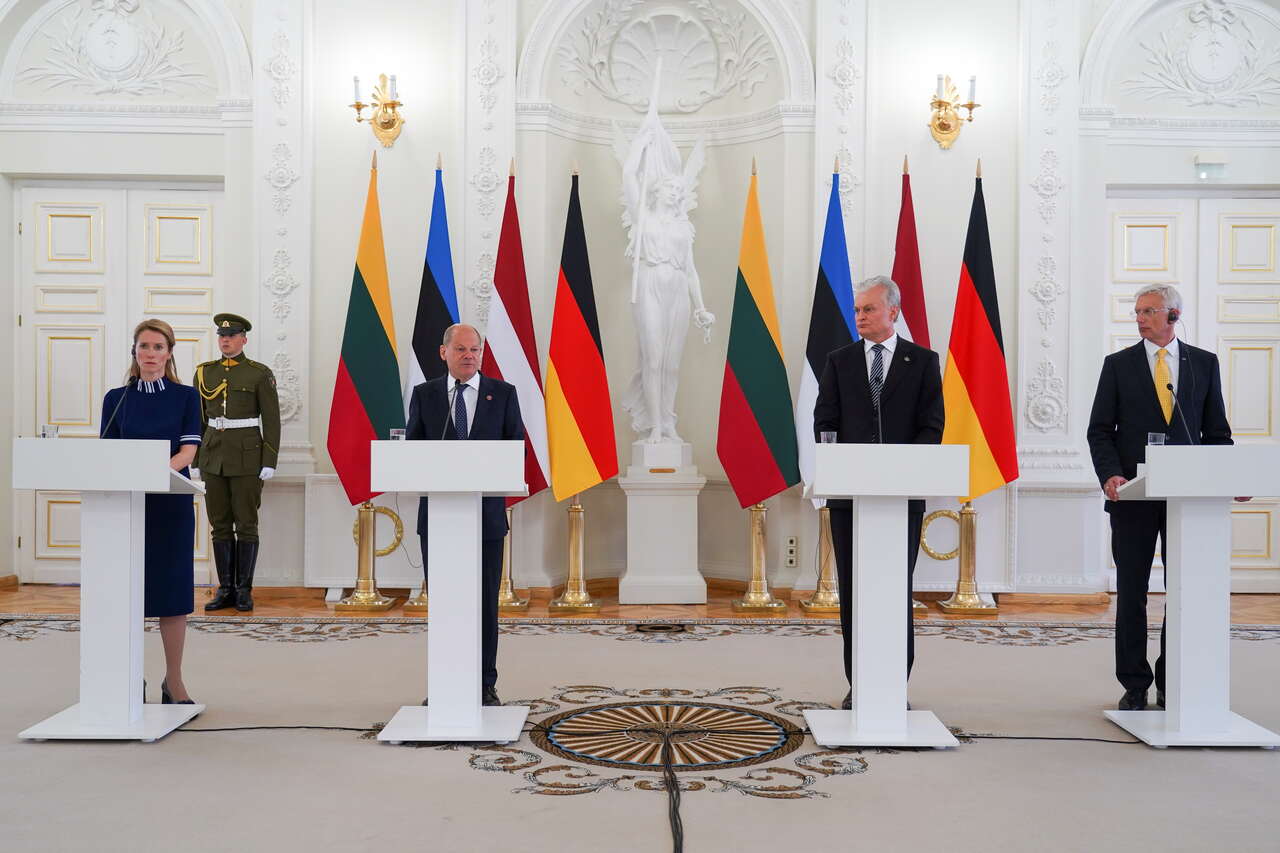Baltic States and Germany Tighten Relations in the Context of Zeitenwende
The Baltic States are intensifying relations with Germany, including in the security dimension, despite previous differences regarding, for example, the perception of threats from Russia. The need to deepen cooperation was clearly demonstrated by the Russian aggression against Ukraine and the unstable situation on NATO’s eastern border. Closer cooperation is fostered by a similar perception of EU matters in which the German, rather than the French model of European integration is closer to the Baltic States’. This Baltic-German cooperation will not weaken the current intensity of their ties with Poland.
 JANIS LAIZANS/Reuters/Forum
JANIS LAIZANS/Reuters/Forum
Security Cooperation
The Russian invasion of Ukraine in February 2022 led to the Baltic States and Germany strengthening their security cooperation. Earlier reluctance resulted from key discrepancies in defence policy assumptions and threat perceptions, primarily concerning Russia. The breakthrough moment was the Russian full-scale invasion of Ukraine, which required Germany to redefine its foreign and security policy (Zeitenwende). Changes were confirmed by the “Security Strategy” published in June this year that assumes, among other things, gradual increases in defence funding to 2% of GDP (from 1.53% in 2021) and pointing to Russia as a direct threat.
The change in the security situation resulted in the intensification of cooperation between the Baltic States and Germany, including the frequency of mutual contacts. For example, in February 2022, Chancellor Olaf Scholz met in Berlin with the President of Lithuania Gitanas Nausėda, the prime ministers of Estonia, Kaja Kallas, and Latvia, Krisjanis Kariņš. Scholz repaid the visits with stops in Riga and Vilnius in April and June last year, in May this year to Tallinn, and just before the July summit of the Alliance, again in Vilnius. The talks focused on the policy towards Russia and the role of Germany in strengthening the Eastern Flank.
Among the Baltic States, Lithuania has the most intensive relations with Germany. In June, German Defence Minister Boris Pistorius confirmed in Vilnius that the Germans are ready to increase the number of soldiers stationed there from around 1,000 to 4,000. Lithuania, in turn, plans to invest €240 million in military infrastructure and mobility by 2025, which is necessary for the reception of allied troops.
After the annexation of Crimea by Russia in 2014, the Baltic States updated their security strategies in order to increase their defence capabilities. In the armament process, apart from the U.S., Germany also played an important role as arms supplier. In 2023, the Lithuanian army signed a contract for 370 Mercedes trucks worth €261 million, among other purchases. Estonia and Latvia plan to acquire an Iris-T SLM air defence system from Diehl Defence.
Collaboration on EU Policy
As a result of Brexit, Germany’s role as a partner of the Baltic States in the EU has increased. Previously, the latter’s main ally in the EU was the United Kingdom, with which they shared, among others, a liberal approach to the economy and an assertive policy towards Russia. Lithuania, Latvia, and Estonia see Germany as a counterbalance to France and its concept of a deeply integrated Union. Like the German government, they do not agree to the French vision of a multi-speed Europe and the excessive increase in the competences of EU institutions at the expense of the Member States. Germany, although it emphasises the need to change voting in the EU Council to majority voting (e.g., on EU foreign policy and taxes), is in favour of representing all countries in the European Commission.
Although the Baltic States and Germany have different positions on China, all of them recognise the risk of Chinese investments in their countries. That is why the three Baltic countries, even before the pandemic, began to seek alternative partners in Asia. In other regions, they share the perspective of formalising the EU’s foreign relations, including with Mercosur and Indo-Pacific and African countries.
The Economic Dimension
Although Germany is not a major economic partner for any of the Baltic States, Germany’s role in their trade balance is increasing. This is the effect in the case of Germany of unfreezing the economy after the pandemic and seeking new directions of cooperation to shorten supply chains. This is also the result of the redirection of trade with Russia and Belarus, primarily by the Baltic States. As a result, Lithuania, Latvia, and Estonia in 2022 recorded significant increases with Germany compared to 2021. Lithuanian imports increased the most, by 28 percentage points (p.p.) up to €6.2 billion, Latvian exchange jumped by 20 p.p. to €2.5 billion, and Estonia’s by almost 22 p.p. to just under €2.5 billion. Exports from the Baltic States to Germany had slightly less growth in percentage terms, with Lithuania increasing by 23 p.p. to €3.5 billion, Latvia by 14 p.p. to €1.4 billion, and Estonia by 8.2 p.p. to €1.2 billion. The Baltic States, being highly dependent on exports, are sensitive to changes in economic conditions, and as a result are watching closely the predictions of a slight recession, by 0.3% of GDP, in Germany, forecast by the IMF for this year.
Since 2022 when the EU decided to end dependence on Russian gas and oil resources, the energy sector has been gaining importance in relations with Germany. Previously, the main limitation for joint actions was Germany’s consent to the construction of the Nord Stream 2 (NS2) gas pipeline in the Baltic Sea, despite the doubts of the Baltic States, motivated by fears of Russia or the doubts of the European Commission as to the NS2’s compliance with EU regulations.
Meanwhile, the energy crisis and the change in the structure of supplies, as well as the need to provide alternative power sources, prompted the authorities of Germany and the Baltic States to invest more—also jointly—in green energy. Hence, the dynamic development of offshore in the Baltic Sea, for example, Latvenergo, a Latvian supplier of energy services, signed a memorandum with the German energy company RWE in September 2022 on the construction of offshore wind farms. However, a rapid increase in renewable energy sources in the region will require guarantees of stability of power grids. In May this year, the energy transmission operators of Germany and the Baltic States concluded a declaration of cooperation, for example when building new connections. German 50Hertz and Estonian Elering also signed a letter of intent regarding an undersea cable project.
Conclusions and Perspectives
Russia’s full-scale invasion of Ukraine has contributed to the intensification of relations between the Baltic States and Germany, which is why security will remain the main area of cooperation, for example as they work to effectively implement the decisions of the Vilnius Summit. At the same time, cooperation between the three countries with a strategic geographical location bordering directly on Russia and Belarus may contribute to the improvement of Germany’s image in the EU, especially in the dimension of eastern policy, and increase Germany credibility as a NATO member increasingly involved on the Eastern Flank.
From the perspective of the Baltic States, it would be beneficial if Germany increased its involvement in the region, especially in the areas of security and the energy sector. Investments in offshore energy in the Baltic Sea and the development of green technologies and innovation are conducive to a further tightening of economic cooperation. At the same time, despite discrepancies in policy, Lithuania, Latvia, and Estonia are still closer to the German view than to the French concept of EU integration.
Germany may also become a more credible partner for the three countries in foreign policy, especially in its eastern dimension. They will do so on the condition that the German declarations remain in force, primarily regarding Russia, as well as reform of defence policy, which is still being debated in Berlin. The intensification of relations between the Baltic States and Germany is in Poland’s interest because it increases Germany’s involvement on the Eastern Flank and the level of European security. The tightening of cooperation between Lithuania, Latvia, and Estonia with Germany will not affect the importance and current intensity of cooperation with Poland, which fully shares the Baltic States' perception of security, including in energy security, and the goals of eastern policy. The changes may positively influence cooperation between not only the Baltic States but also Poland and Germany to strengthen security in the region, for example, in terms of increasing the interoperability of troops.


